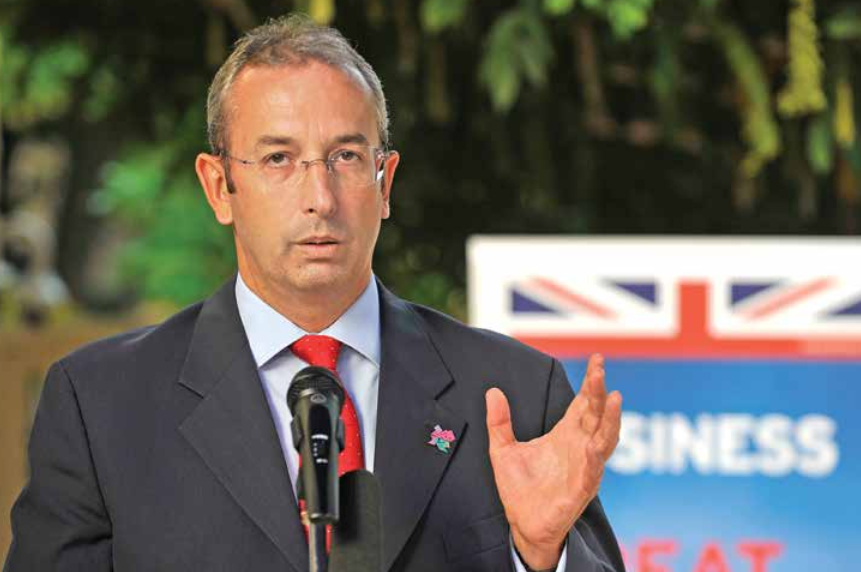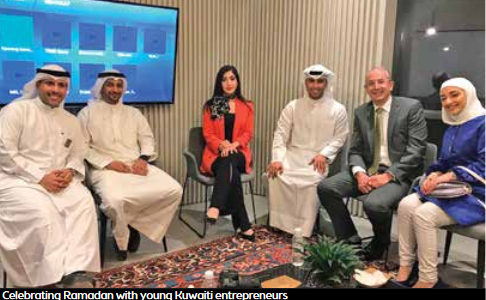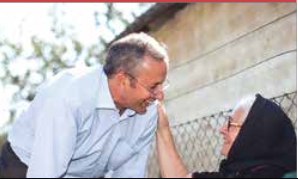The most recent European Commission report on Serbia’s accession highlights many of the same issues, especially in the areas of rule of law and media freedom, about which the EU Delegation expressed concern during my mandate

Ambassador Michael Davenport lived in Serbia for seven years; first as the UK ambassador and subsequently as the Head of the EU Delegation in Serbia. Today, Mr Davenport is the UK ambassador to Kuwait. He was kind enough to give us an interview in which he talks about the topics related to Serbia, Brexit, the situation in the Middle East and many other issues.
After seven years spent in Serbia, as the UK ambassador (2011-2014) and the Head of the EU Delegation in Belgrade (2014-2017), it would be great to hear your opinion about Serbia in 2011, Serbia in 2017 and Serbia today.
— It was a great privilege to serve in Belgrade both as the EU and as British Ambassador. My family and I made many dear friends in Serbia, whom we miss very much. We have been fortunate to host some of them in Kuwait and are in regular contact with many people in what became our second home. I was pleased to be able to support the aspiration of successive Serbi-an leaders to take Serbia into the European Union, and especially to attend the formal opening of negotiations when I was Head of Delegation. The most recent European Commission report on Serbia’s accession highlights many of the same issues, especially in the areas of rule of law and media freedom, about which the EU Delegation expressed concern during my mandate.
It is good to see these important matters being tackled. As the Head of the EU Delegation in Belgrade, could you comment on the current situation with Brexit in the UK? Which scenario do you expect to happen?
— The British people voted in 2016 to leave the European Union, and successive governments since then have sought to implement the people’s will. Negotiating to leave the EU, for which there is no precedent, is no easier than negotiating to join. Where we end up will, of course, depend on the outcome of current negotiations and elected parliamentarians in all 28 countries. In any scenario, I am confident that close co-operation on common challenges between the UK and EU partners will remain a high priority.

The situation in the Middle East has been fragile for the last 40 years, more or less. This year is the 40th anniversary of the Islamic Revolution in Iran. Could you tell us how you see the present situation?
— The Middle East is a highly volatile region beset by violent conflicts creating humanitarian crises and untold human suffering in Syria, Yemen, Libya and elsewhere. It is essential to support international efforts to resolve these conflicts, especially through the United Nations. Resolution of the Arab-Israel dispute – based on the two-state solution – becomes more urgent every day. Britain is committed, along with EU partners, to the Joint Comprehensive Plan of Action with Iran, as the best means of ensuring international accountability of Iran’s nuclear industry. But in parallel Iran must halt its activities to undermine regional stability and threaten international shipping. As the UK ambassador to Ku-wait, what is your comment on the results of the Arab Spring from 2011 until the present?— I served in Egypt before the Arab Spring and later watched the initial excitement and euphoria over prospects for serious reforms being dashed and disappointed. People across the whole region deserve to live in peace and dignity, without which neither fundamental human rights nor improved standards of living will be more widely respected or achieved. Ku-wait, along with the UK, is a major donor, supporting international efforts, led by the UN and the International Committee of the Red Cross, to relieve suffering in war zones such as Yemen and Syria. Lasting peace, however, can only be arrived at through dialogue and political compromises. You were the Head of the EU Delegation in Belgrade when the Balkan migrant route was opened in 2015.
 Today, four years later, what do you think of the current situation (the mistakes made by the EU, USA, Balkan countries, Turkey)?
Today, four years later, what do you think of the current situation (the mistakes made by the EU, USA, Balkan countries, Turkey)?
— The migration crisis has presented a major challenge to all European countries, exposing shortcomings in border management across the continent. I was proud of the major contribution which the EU Delegation in Serbia made at the height of the crisis in 2015 to help Serbia meet its responsibilities towards refugees and migrants arriving in the country. Working closely with the United Nations High Commissioner for Refugees and others, the EU Delegation was instrumental in ensuring that Serbia’s facilities for welcoming refugees and migrants met international standards. I am pleased that more recently Serbia has also shown a responsible approach towards those who have sought refuge in Serbia for the longer term.
When voting was first introduced in Kuwait in 1985, Kuwaiti women had the right to vote. This right was later removed. What is the situation today?
— In May 2005 the Kuwaiti parliament passed a law to give women the right to vote. I have had the opportunity to meet some of those women, such as the remarkableLoulwa Al Mulla, who led a campaign over many years to achieve this historic outcome. Kuwait is justifiably proud of its longstanding tradition of debate, as seen in its culture of “Diwaniyas”, or in-formal gatherings of citizens, and as we see today in the burgeoning activism of NGOs on environmental issues.

IT WAS MY PRIVILEGE TO HELP PEOPLE REBUILD THEIR BUSINESSES AND THEIR LIVES AFTER FLOODS OF 2014
Which are your favourite places (towns, villages, restaurants, museums…) and persons in Serbia?
— Too many to list them all! I am of course especially honoured to be an Honorary Citizen of Pančevo in Vojvodina. However, there is a very special place in my heart for those towns and villages in Serbia which were worst affected by the catastrophic floods of 2014. Ordinary citizens in towns like Obrenovac, Šabac, Trstenik, Svilajnac, and other places along the Morava and Mlava rivers, showed remarkable fortitude in the face of the sudden flooding. For the wonderful team at the EU Delegation it was a privilege to be part of a major programme to rebuild houses, schools and roads, and to help people rebuild their businesses and their lives. Without EU financial and logistic support this would certainly have taken a good deal longer.